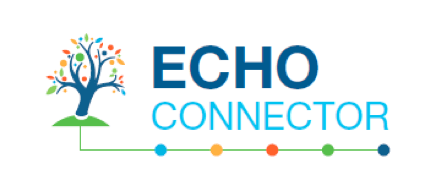
Welcome to the first ECHO Connector! The Environmental influences on Child Health Outcomes (ECHO) Program is a research program at the NIH with the mission to enhance the health of children for generations to come. The ECHO Connector will keep you informed of program news and our latest research findings.
Message from Matt
A message from the ECHO Director, Matthew W. Gillman, MD

As ECHO Program Director, it is my pleasure to introduce you to the first issue of the ECHO Connector.
The ECHO Connector is a forum to share information, inform you of recent publications and upcoming events, and spark conversation and collaboration. I hope that these emails will serve as a way for ECHO to connect with organizations like yours and individuals across the country who are interested in child health research.
ECHO focuses on five key pediatric outcomes with large public health impact: Pre-, peri-, and postnatal; Upper and lower airway; Obesity; Neurodevelopment; and Positive Health, or well-being.
The program has two major components, the ECHO Cohorts—for observational research, and the ECHO IDeA States Pediatric Clinical Trials Network (ISPCTN)—for interventional research.
In an observational cohort study, researchers investigate what is happening with study participants’ health over time, and why, without intervention. ECHO weaves together information from 72 long-term ongoing maternal-child cohort studies totaling about 50,000 children from racially, socioeconomically, and geographically diverse backgrounds.
In an interventional clinical trial, researchers test how well a new prevention or treatment strategy works. ISPCTN conducts this type of research across 17 sites with rural or underserved children.
Together within this program, these two types of research have the potential to answer big questions about how influences in early human development—even before birth—affect us throughout our lives and across generations. This information can help inform state and/or national policies, public health programs, or clinical care to help kids live healthier lives.
ECHO can also address pressing public health needs—like the ongoing opioid crisis and the current COVID-19 pandemic. We’ve quickly mobilized to look at how the coronavirus affects pregnant women and children. You can read more about our efforts in ECHO’s Response to COVID-19 and Establishing a Standard of Care for Babies Born Dependent on Opioids below.
I believe that ECHO has the right formula of cohorts, clinical trials, and supporting resources to provide evidence to move the needle in child health. I look forward to sharing information about our research and partnering with you.

—Matthew W. Gillman, M.D., S.M.
Back to top
ECHO at a Glance
2 Types of Research

Learn More about ECHO Research
Back to top
Upcoming Events for You to Join
NIH ECHO Child Health Webinar
- ECHO's mission
- Updates on our latest research
- New efforts regarding the effects of COVID-19 on pregnant women and children
- Commitment to health equity and our work with diverse, rural, and underserved populations
- And more!
Join us for an upcoming ECHO Discovery!

Topic: Positive health is about physical, mental, and social well-being, and broadens our view of health as more than the absence of disease. In this presentation, we will:
- Define the concept of positive health
- Examine how the life course health science framework can be used to study positive health
- Assess ways that positive health has been measured in past ECHO studies and ways it can be studied with the ECHO-wide Cohort Data Collection Protocol
Speakers: Christopher B. Forrest, MD, PhD, Children's Hospital of Philadelphia, and Jody Ganiban, PhD, Department of Psychology, George Washington University
- Meeting number (access code): 738 498 446
- Meeting password: ECHO
- JOIN BY PHONE: 1-650-479-3207
Back to top
ECHO's Response to COVID-19
 As the novel coronavirus epidemic continues to affect communities across the world, ECHO is committed to protecting the health and safety of its staff and participants while advancing our research mission of enhancing the health of children for generations to come. In addition to following guidance from our national and local governments, many of our studies have, at least temporarily, limited activities to those that they can do at a distance.
As the novel coronavirus epidemic continues to affect communities across the world, ECHO is committed to protecting the health and safety of its staff and participants while advancing our research mission of enhancing the health of children for generations to come. In addition to following guidance from our national and local governments, many of our studies have, at least temporarily, limited activities to those that they can do at a distance.
In response, ECHO researchers are working together to use innovative approaches to keep research going remotely.
Many ECHO Cohorts are moving toward collecting data from a distance. Fortunately, the ECHO-wide Cohort data collection protocol includes online, mail, and phone surveys, as well as sample collection by mail. Like the ECHO Cohorts, the ECHO IDeA States Pediatric Clinical Trials Network (ISPCTN) paused ongoing clinical trials in early Spring 2020, but has started to resume them with a shift toward more remote research tools including remote informed consent, interventions, and data and sample collection.
In these ways, ECHO is responding to the ongoing pandemic by introducing new ways of conducting research, some of which may very well continue once the pandemic is under better control.
ECHO’s contribution to COVID-19 research
ECHO is also joining with researchers around the world to contribute to understanding how COVID-19 affects pregnant women and children.
ECHO researchers are working together in record time to incorporate COVID-19 research in ongoing and new studies. This work is being led by a COVID-19 task force for ECHO ISPCTN and a COVID-19 working group for ECHO Cohorts.
The ISPCTN task force, chaired by Paul Palumbo, MD, includes eight members with a range of expertise such as pediatric infectious diseases, perinatal transmission of disease, and vaccine delivery. The task force is identifying specific COVID-19-related intervention trials that this network of rural and underserved children could mount.
The ECHO Cohorts rapidly produced COVID-19-specific questions that are now part of the ECHO-wide Cohort data collection protocol. To be maximally useful for other researchers, two public NIH websites feature these questionnaires: https://dr2.nlm.nih.gov or https://www.phenxtoolkit.org/covid19.
The Cohort COVID-19 Working Group has been focused on facilitating responses to the ECHO-specific Notice of Special Interest (NOSI) for ECHO COVID-19-related research, and is now turning its attention to the longer-term impact of the pandemic.
Back to top
News You Can Use
New Video Outlines Participant Role in ECHO
ECHO Study Summaries Now Available
A new resource on the ECHO Program website—the Study Summaries page under the Sharing Our Science tab on the ECHO website—invites visitors to read plain-language study summaries of ECHO publications. The new page continues our commitment to sharing results for ECHO Program studies.
Summaries include research on:
- General health and life satisfaction in children with chronic illness
- Prenatal opioid exposure and its effects on child health outcomes
- The potential role of Vitamin E in preventing or treating bronchopulmonary dysplasia
The ECHO Coordinating Center will continue to post ECHO study summaries as they become available.
To learn more about our commitment to sharing results, read ECHO’s Guiding Principles here.
Establishing a Standard of Care for Babies Born Dependent on Opioids
Lead Investigators: Leslie Young, University of Vermont, Lori Devlin, University of Louisville, Stephanie Merhar, University of Cincinnati
As the opioid epidemic continues to affect families across the United States, opioid exposure in the womb has attracted more attention. When a woman uses opioids while she is pregnant, her newborn baby can have symptoms of withdrawal such as intense fussiness, inability to eat well, and poor sleep. Neonatal Opioid Withdrawal Syndrome, or NOWS, has increased five-fold over the last decade, but evidence as to the best approach for assessing and treating these infants is lacking.
That’s why ECHO—in partnership with the NIH Eunice Kennedy Shriver National Institute of Child Health and Human Development (NICHD)—is launching the Advancing Clinical Trials in Neonatal Opioid Withdrawal (ACT NOW) initiative. One intervention trial slated to begin in late summer 2020 is Eating, Sleeping, and Consoling for Neonatal Opioid Withdrawal (ESC-NOW). In this study, researchers will test the effectiveness of ESC, a new method that nurseries can adopt for assessing and treating infants with NOWS. Comparing ESC to the usual care NOWS babies receive, they’ll evaluate how the ESC approach affects the short term—being ready for discharge from the hospital--as well as longer-term: how this approach affects family and infant well-being, as well as how well the baby’s brain is developing, during the first 2 years of life.
The ESC approach engages parents and other primary caregivers in the treatment of NOWS. It emphasizes tactics like holding, swaddling, and rocking in low stimulus environments, thus potentially lowering the need for medication.
Up to 3,000 infants and their primary caregivers will be included in this clinical trial across 26 sites in the United States. By filling gaps in our knowledge of how to take care of these babies, the results of this study may very well set a standard for improving the care of infants with NOWS.
ESC-NOW is one of several ACT NOW studies funded through the National Institutes of Health Helping to End Addiction Long-term (HEAL) Initiative.
ECHO Researchers Learn How Children's Sleep Quality is Associated with Overall Life Satisfaction

Most sleep research focuses on how poor sleep may cause health problems. Taking a different approach, ECHO researcher Courtney Blackwell and her team recently conducted a study to determine how better sleep quality may lead to positive health outcomes. In an article published in Quality of Life Research, Blackwell and team found that better sleep quality in school-age children was associated with lower psychological stress and better general health status, which in turn, predicted better life satisfaction.
“Existing literature primarily focuses on the negative impacts of sleep. Our team is excited to contribute to the growing body of research on associations of sleep quality on children’s positive well-being,” said Blackwell.
To conduct this study, ECHO researchers asked parents and caregivers to complete surveys about their children’s sleep quality, general health, stress, and life satisfaction. More than 1,000 caregivers of 5- to 9-year-old children from three ECHO Cohorts participated in this study, creating a diverse population that none of the Cohorts offered individually.
Overall, this study suggests that children whose sleep quality is better experience higher levels of life satisfaction.
For more information, read the study summary.
Back to top
![]()
ECHO by the Numbers

Back to top
![]()
Did You Know

July is Cord Blood Month. Cord blood is an important biospecimen that the ECHO Program collects from some studies as part of the ECHO-wide Cohort Data Collection Protocol.
Back to top
![]()

Subscribe to receive a copy of the ECHO Connector newsletter through email.
Questions?
Contact the ECHO Program Office.




